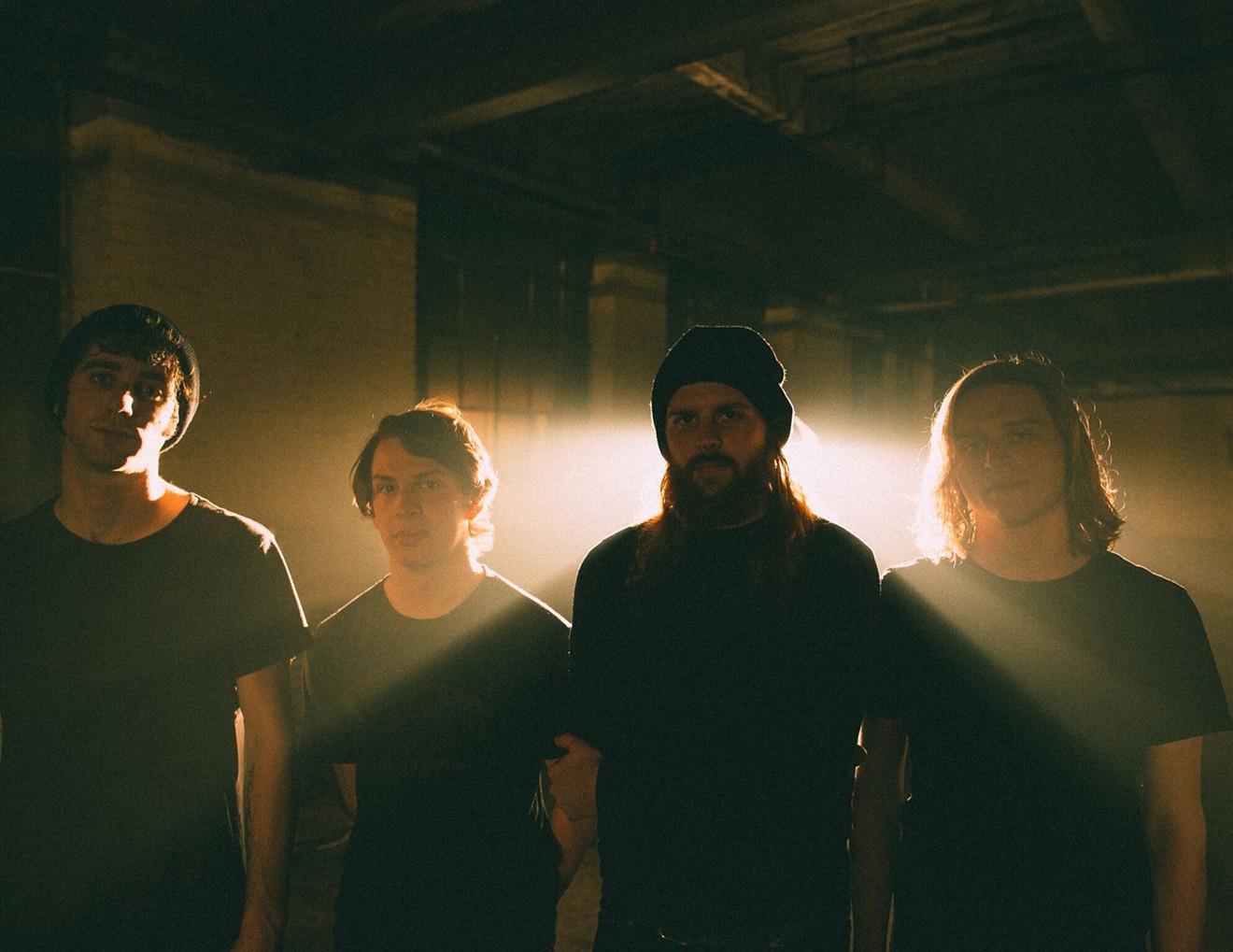"It's been awhile since I've seen God and I'm not trying to lead him on, but he's always trying to fuck me to the tune of my favorite song," Cameron Boucher sings on the stirring "A Portrait Of." The second song on Sorority Noise's fantastic 2017 album You're Not As ___ As You Think, it encapsulates so many of the potent themes that haunt the band's third studio album: grief, loss, religion, and the feeling that the universe is getting ready to pile even more shit on top of you at any moment.
One of the leading lights of the so-called emo revival, Sorority Noise stand shoulder to shoulder with contemporaries like Modern Baseball and The World is a Beautiful Place & I am No Longer Afraid to Die. These groups are able to create ambitious, unapologetic rock music that also manages to avoid falling in the toxic masculinity pit traps that so many other "sadboy" bands fall into. And with the emotionally wrenching You're Not As ___ As You Think, Sorority Noise haven't just crafted an album that stands as one of the best efforts of the emo revival: they've made an album that's going to be hard for any guitar-centric band to top this year.
Much of the album's power comes from the lyrics of the band's chief songwriter, Cameron Boucher. Their third album was heavily influenced by the death of several close friends to the band; it was also inspired by Boucher's struggles with depression. It was one of many subjects he talked to us about as we picked his brain about the group's new record.
New Times: In addition to being a songwriter, you've also done the producing and engineering on past Sorority Noise records. You're Not As ___ As You Think is the first time your band has worked with an outside producer. What was it like working with a different pair of ears in the room? Did it have an effect on the way you all wrote and worked in the studio?
Cameron Boucher: It was something I was hesitant to do at first, because my brain kinda functions as a producer as it is. But we got to work with Mike Sapone, who truly is the best of the best. He worked on every Brand New record, he’s worked with Taking Back Sunday, he’s worked with some truly incredible people.
We did four days of pre-production, where we recorded full band versions of all the songs at my studio. So I got to have a tight grip on that portion of things, and then Mike came in. He only added things, he didn’t have us change anything. He just told us how to make them more interesting. He also didn’t touch any of the lyrics, which was awesome to me. Every morning, I got to edit the sessions before we started recording again and pick the takes that I liked. It was great because I got to be involved while also having another set of ears and another brain on it. We worked pretty symbiotically.
Do you think working with outside producers is something you'd like to do for future Sorority Noise records, or are you interested in going back to doing things "in-house" again?
I’m on this kick right now where I’m trying to be involved with as many different musical projects as I can to influence my own musical process. I’m trying to get to know how different people function because I think pulling from outside resources and different ideas can always be an additive to your writing. So yeah, I’d be totally open to working with someone again, especially Mike.
In past interviews, you've talked about how you always try to write songs strictly from your own point of view. On the new album, though, you do adopt a different POV on "First Letter from St. Sean." I was wondering if that experiment in singing through another person's voice is something you're interested in exploring further as a songwriter, or are you more interested in maintaining your focus on doing personal, autobiographical storytelling?
That was the only time I've done that, and I don’t know if I’ll do it again — perhaps just to drive home the point about my friend Sean, who passed away. The song’s from his perspective. I don’t know, it’s not something that I’d rule out in the future, it just depends on how the songs come out when they come out.
I've heard you have a Smiths tattoo. What is it of?
I got “There Is a Light That Never Goes Out” on my upper right bicep. Can you call it a bicep when there’s no muscle? Upper right arm, I guess. It’s a lighthouse and around it says “There Is a Light That Never Goes Out.” I got it a few years ago; it’s only half-finished.
What music have you been listening to lately that you've been drawing inspiration from?
I’ve been listening to this jazz saxophone player Clifford Jordan. He put out this record that I’ve been all about lately. It’s got songs on there named after Eddie Harris and John Coltrane — it came out in ‘67, I think. It’s very beautiful. I had never heard of him before, and I’m a huge jazz fan.
There’s this band, Animal Flag, from Boston that I listen to a lot, too. They kick ass; they opened for Thursday recently, and they looked insane.
You've often talked about your own mental health issues and your wrestling with depression. How do you maintain your equilibrium when you're on the road? I'm bipolar, so I have to deal with bouts of depression where the last thing I want to do is be around other people. In your line of work, though, you don't have that luxury. You're surrounded by people all the time. How do you manage to stay on an even keel?
It’s hard, truly. But writing and performing music is my greatest form of therapy. Since I’m willing to have intense lows in order to be able to play music. When I play and when I’m writing, I’m trying to leave all that behind me so I can walk away with a clear head. There are some really bad days, though, definitely. Since I talk a lot about depression, after shows people will often want to come up and talk to me about it. And I’m always wanting to talk to them about it, but sometimes I go through these panic attacks where I’m trying to walk from one side of the room to the other. So when they approach me — and as fortunate as I am that they’re interested in talking to me, because it means the world that they would want to share that with me — it’s hard. I used to really struggle with it, but now I try to say ‘Hey, I’m in a really bad head space right now. I would love to talk, but I need to go for a walk. I’ll be back in a hour, and hopefully if you’re still around we can talk.’
I think it’s all about getting to know yourself and knowing what you’re capable of. And I’m also fortunate to have my bandmates. They’ve been my friends and a part of my life for the last four to five years, and they’re always willing to help out.
What are you working on right now?
I’m working pretty much all the time on music. These last six months, for the first time in my life, music is the thing that pays my rent — which is crazy to me! Sorority Noise has another 7-inch coming out soon. I finished an LP with a jazz quintet and I also finished a new LP with my band Small Circle. Being in so many projects, it’s nice being able to spread things out because the last thing I want to do is over-saturate with Sorority Noise records. A 7-inch in the fall could be in order — it’s already recorded, so it’s definitely going to happen.
Sorority Noise will be performing on Monday, May 1, at The Rebel Lounge in Phoenix.
[
{
"name": "Air - MediumRectangle - Inline Content - Mobile Display Size",
"component": "18478561",
"insertPoint": "2",
"requiredCountToDisplay": "2"
},{
"name": "Editor Picks",
"component": "16759093",
"insertPoint": "4",
"requiredCountToDisplay": "1"
},{
"name": "Inline Links",
"component": "17980324",
"insertPoint": "8th",
"startingPoint": 8,
"requiredCountToDisplay": "7",
"maxInsertions": 25
},{
"name": "Air - MediumRectangle - Combo - Inline Content",
"component": "16759092",
"insertPoint": "8th",
"startingPoint": 8,
"requiredCountToDisplay": "7",
"maxInsertions": 25
},{
"name": "Inline Links",
"component": "17980324",
"insertPoint": "8th",
"startingPoint": 12,
"requiredCountToDisplay": "11",
"maxInsertions": 24
},{
"name": "Air - Leaderboard Tower - Combo - Inline Content",
"component": "16759094",
"insertPoint": "8th",
"startingPoint": 12,
"requiredCountToDisplay": "11",
"maxInsertions": 24
}
]











